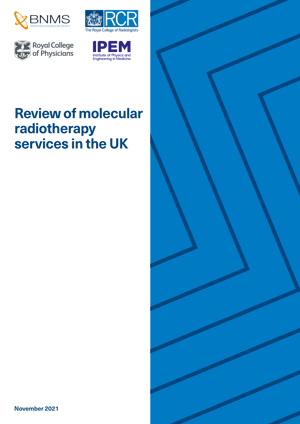Review of molecular radiotherapy services in the UK
Date: 2021
Date of next review: 2024
Molecular radiotherapy services have for many years been an important, but much neglected, pillar of cancer care. Research investment has paid dividends and a number of new drugs are poised to revolutionise the management of certain cancers over the coming years. However, if the UK population is to fully benefit from molecular radiotherapy advances in terms of hard won improvements in both symptoms and survival, patients need to be able to access the agents easily, regardless of where they live. In turn, this requires the healthcare systems within the four nations to effectively commission the new agents, as well as rapidly invest in the workforce and physical environments to ensure their safe delivery.
Major findings
- The provision of molecular radiotherapy services across the UK is not uniform.
- There is no clear ‘ownership’ of molecular radiotherapy services in the UK. Services are delivered by different medical specialties, often depending on locally available skills, with no coordinated national leadership to ensure an equitable, high-quality provision of services.
- The provision of a particular form of molecular radiotherapy that a patient may benefit from may depend on where they live within the UK (so called postcode lottery).
- Stated reasons regarding why this variation exists include lack of trained staff, lack of physical facilities and variations in NHS reimbursement for these treatments in different parts of the UK
- The requirement to deliver molecular radiotherapy is likely to increase dramatically over the next decade. Most UK regions and nations are not prepared for this oncoming change.
- This dramatic increase in demand for molecular radiotherapy services may begin by 2022 especially if Lu-177 PSMA is licenced and approved by the National Institute for Health and Care Excellence (NICE) for treatment of metastatic prostate cancer.
This report is the joint effort of the Royal College of Physicians, the Institute of Physics and Engineering in medicine, the British Nuclear Medicine Society and the RCR.
